Understanding Hearing Loss
10 Ways Anxiety Can Cause Temporary Hearing Loss
Step into the world where anxiety clouds our hearing, revealing 10 surprising ways it can lead to temporary loss – the secrets are waiting to be uncovered!

When anxiety grips us, it’s like a storm cloud blocking out the sounds around us.
But did you know that this mental tempest can also play tricks on our hearing abilities?
From the impact of adrenaline to the changes in cortisol levels, there are numerous ways anxiety can lead to temporary hearing loss.
Understanding these connections may shed light on how our mental state influences our auditory experiences, prompting us to explore the intricate relationship between anxiety and hearing in a new light.
Key Takeaways
- Anxiety affects cochlear blood flow and ear muscles, leading to temporary hearing loss.
- Stress hormones like cortisol alter inner ear sensitivity and auditory processing, impacting sound interpretation.
- Cognitive distortions from anxiety exaggerate sounds' intensity and misinterpret auditory cues.
- Anxiety medications, like benzodiazepines, can cause tinnitus and other temporary hearing changes.
Impact of Adrenaline on Hearing
The impact of adrenaline on hearing is significant during moments of anxiety, causing temporary changes in sound perception. When adrenaline is released during periods of stress, it can constrict blood vessels in the inner ear. These constrictions affect the flow of blood to the cochlea, the spiral-shaped cavity responsible for sound transmission. As a result, the cochlea may not function optimally, leading to disruptions in sound perception.
Furthermore, increased levels of adrenaline can impact the auditory nerves, which play a crucial role in relaying sound signals to the brain. The stress-induced adrenaline can interfere with the normal functioning of these nerves, resulting in temporary hearing loss.
Individuals experiencing heightened levels of adrenaline due to anxiety may notice symptoms such as muffled sounds or difficulty in distinguishing speech. However, it's essential to note that the temporary hearing loss caused by adrenaline-related effects typically resolves once the anxiety or stress diminishes. Understanding how adrenaline affects hearing can provide insights into managing temporary hearing issues associated with anxiety.
Muscle Tension and Hearing Loss

During episodes of anxiety, the effects of muscle tension on hearing can result in temporary hearing loss.
- Muscle tension caused by anxiety can impact the tiny muscles in the ear responsible for hearing, leading to a temporary decrease in hearing acuity.
- Increased muscle tension in the neck and shoulders can impede blood flow to the ears, affecting their ability to accurately perceive sounds.
- Anxiety-induced muscle tightness can disrupt Eustachian tube function, causing pressure imbalances in the middle ear and resulting in transient hearing difficulties.
- Stress-related muscle tension may induce spasms in the middle ear muscles, interfering with the transmission of sound waves and causing temporary hearing loss.
Utilizing relaxation techniques such as deep breathing and massage can help alleviate muscle tension associated with anxiety, offering temporary relief from hearing issues.
Understanding the intricate relationship between muscle tension and temporary hearing loss can aid individuals in managing anxiety-induced auditory challenges effectively.
Altered Blood Flow in Ears
Altered blood flow in the ears during episodes of anxiety can significantly impact auditory function and contribute to temporary hearing loss. When anxiety levels rise, the body releases stress hormones that can lead to changes in blood circulation, affecting the inner ear's delicate structures. This fluctuation in blood flow can disrupt the optimal functioning of the hair cells responsible for converting sound waves into electrical signals the brain can interpret.
Consequently, individuals may experience a temporary hearing loss as a result of this altered blood flow pattern. However, it's essential to note that once anxiety diminishes, blood flow tends to return to normal, and hearing loss typically resolves. Managing anxiety through relaxation techniques such as mindfulness, deep breathing, or therapy can aid in restoring proper blood flow to the ears and alleviating the temporary hearing impairment caused by heightened anxiety levels.
Cortisol Levels and Hearing

Elevated cortisol levels resulting from anxiety can impact auditory sensitivity, potentially leading to temporary hearing loss. When cortisol levels are high due to stress and anxiety, several mechanisms come into play, affecting hearing:
- Inner Ear Sensitivity: Stress-induced cortisol release can alter the inner ear's sensitivity to sound, making it harder to perceive auditory signals clearly.
- Blood Flow Reduction: Cortisol can reduce blood flow to the inner ear, impairing its ability to transmit sound signals effectively, thus contributing to temporary hearing loss.
- Auditory Processing Disruptions: High cortisol levels can influence the auditory processing centers in the brain, causing temporary disruptions in how sound information is interpreted.
- Research Findings: Studies indicate that cortisol imbalances during times of anxiety can lead to difficulties in auditory processing, underscoring the connection between stress, cortisol levels, and temporary hearing loss.
Managing stress and anxiety levels becomes crucial in mitigating the impact of cortisol on hearing health.
Increased Sensitivity to Sounds
Increased sensitivity to sounds can be a common manifestation of anxiety, often leading to temporary hearing loss. When anxiety levels are elevated, auditory hypersensitivity can occur, causing difficulties in accurately perceiving sounds. This heightened sensitivity can result in challenges distinguishing speech from background noise, affecting communication. Individuals experiencing anxiety-induced hearing changes may encounter distorted or muffled sound perceptions, impacting their overall auditory experience.
Stress levels play a significant role in amplifying the perception of loud noises, further exacerbating temporary hearing issues caused by anxiety. The combination of anxiety and stress can create a situation where sounds are perceived as louder or more intense than they actually are, contributing to the temporary hearing loss phenomenon.
Understanding the relationship between anxiety, stress levels, and auditory hypersensitivity is crucial in addressing temporary hearing loss effectively. By recognizing the impact of anxiety on sound perception, individuals can take proactive steps to manage their stress levels and mitigate the temporary hearing challenges associated with heightened sensitivity to sounds.
Tinnitus Aggravation by Anxiety

When anxiety heightens, tinnitus can flare up, intensifying the ringing or buzzing in our ears. This exacerbation can make us more sensitive to sounds, impacting our overall hearing sensitivity.
Stressful situations can trigger auditory distortions, amplifying the perceived loudness of tinnitus sounds.
Anxiety-Induced Tinnitus Flare-Ups
Exacerbating tinnitus symptoms, anxiety can lead to flare-ups characterized by heightened perception of ringing or buzzing in the ears. When anxiety-induced tinnitus flare-ups occur, individuals may experience an increased awareness of ear noises, making it challenging to focus. The perception of ringing or buzzing can become more pronounced, affecting daily activities. Stressful situations and high blood pressure can further exacerbate tinnitus symptoms, intensifying the impact of anxiety on hearing. Managing anxiety is crucial to reduce the severity of these episodes and alleviate temporary hearing issues associated with stress.
- The overwhelming nature of heightened awareness of ear noises during anxiety-induced tinnitus flare-ups can disrupt concentration.
- The increased perception of buzzing or ringing can be distressing, impacting overall well-being.
- Managing anxiety effectively may help in reducing the severity of tinnitus symptoms.
- Understanding the link between anxiety and tinnitus is essential for improving overall ear health.
Impact on Hearing Sensitivity
During anxiety-induced tinnitus flare-ups, heightened hearing sensitivity can intensify the perception of ringing in the ears, exacerbating the impact of stress on auditory perception.
Anxiety can significantly impact hearing sensitivity, making individuals more attuned to background noises and the ringing associated with tinnitus. This heightened sensitivity can lead to a magnified experience of tinnitus symptoms, contributing to temporary hearing loss during stressful periods.
The auditory system's response to anxiety-induced stress can further exacerbate these issues, potentially causing difficulties in sound processing and perception. Individuals with anxiety may find themselves struggling with muffled sounds, challenges in noisy environments, or a feeling of ears being blocked due to the increased sensitivity in their hearing.
Stress and high blood pressure, common companions of anxiety, can also contribute to these temporary hearing disturbances.
Stress-Triggered Auditory Distortions
Amplifying the impact of tinnitus, anxiety can trigger auditory distortions that lead to temporary hearing loss and challenges in sound processing. This exacerbation occurs due to the heightened levels of stress and anxiety, which can worsen tinnitus symptoms.
The following list highlights the emotional toll of stress-triggered auditory distortions:
- Frustration: Coping with both anxiety and amplified tinnitus sounds can lead to increased frustration and irritability.
- Isolation: Difficulty in processing sounds can result in feeling isolated or disconnected from the environment.
- Anxiety: The cycle of anxiety and auditory distortions can create a feedback loop, further increasing stress levels.
- Impaired Communication: Challenges in hearing perception can hinder effective communication, impacting relationships and daily interactions.
Cognitive Distortions and Hearing

Anxiety-induced cognitive distortions can profoundly influence how we perceive and process auditory stimuli, potentially leading to temporary hearing difficulties.
These distorted thought patterns may cause us to misinterpret sounds or amplify their significance, resulting in a temporary decrease in hearing acuity.
The impact of anxiety-related cognitive distortions on our hearing underscores the intricate interplay between mental health and our ability to accurately perceive auditory information.
Distorted Thoughts Affecting Hearing
How do cognitive distortions, influenced by anxiety, impact the perception of auditory information and hearing accuracy? Distorted thoughts can significantly alter how we interpret sounds, leading to temporary hearing loss.
Here are four ways distorted thoughts affect hearing:
- Magnification: Sounds may be exaggerated, appearing louder or more distressing than they actually are.
- Filtering: Cognitive distortions act as a filter, distorting the true nature of sounds before they reach our brain.
- Misinterpretation: Anxiety-induced cognitive distortions can cause misinterpretation of auditory cues, affecting comprehension.
- Selective Attention: Certain sounds may be amplified while others are ignored, impacting overall hearing accuracy.
Impact of Anxiety Cognitive
Distorted thoughts influenced by anxiety can significantly impact the perception and processing of auditory information, potentially leading to temporary hearing difficulties. Cognitive distortions caused by anxiety can result in individuals misinterpreting sounds and conversations. Anxiety creates a negative filter, causing a focus on perceived threats instead of accurately processing auditory stimuli. Heightened anxiety leads to exaggerated or distorted perceptions of sound, contributing to temporary hearing loss. Cognitive biases influenced by anxiety may hinder how individuals interpret and react to sounds, creating barriers to effective communication. The table below summarizes the impact of cognitive distortions influenced by anxiety on hearing:
| Impact of Anxiety Cognitive on Hearing |
|---|
| Misinterpretation of sounds and conversations |
| Negative filter focusing on threats |
| Exaggerated perceptions of sound |
| Hindrance in effective communication |
Fight or Flight Response Impact

During moments of heightened anxiety, the fight or flight response can impact hearing sensitivity, leading to temporary changes in auditory perception. This physiological response, designed to prepare the body for perceived threats, can influence the way we hear sounds. Here are four ways in which the fight or flight response can affect our hearing:
- Stress Hormones: Increased levels of stress hormones during anxiety can disrupt the normal functioning of the auditory system, contributing to temporary hearing loss.
- Blood Flow: Anxiety-induced changes in blood flow, particularly to the inner ear, can compromise its ability to process sound effectively, resulting in temporary hearing issues.
- Survival Instincts: The body's prioritization of survival instincts during anxious moments may divert attention away from auditory processing, impacting our ability to perceive sounds accurately.
- Reversibility: Fortunately, temporary hearing loss caused by anxiety is reversible once the stress response subsides, highlighting the transient nature of this auditory phenomenon.
Stress-Induced Hearing Threshold Shift

When stress levels are high, our hearing sensitivity can be impacted, leading to temporary changes in our ability to perceive certain frequencies.
This shift in hearing thresholds is reversible, meaning that once stress levels decrease, our auditory function can return to normal.
Understanding the impact of stress on our hearing can help us recognize and address temporary hearing issues effectively.
Impact of Stress
Research indicates that stress can induce temporary shifts in hearing thresholds, impacting the ability to perceive certain frequencies. When stress affects hearing, several key mechanisms come into play:
- Cortisol Impact: Elevated levels of cortisol, a stress hormone, can influence the auditory system and lead to temporary hearing difficulties.
- Vasoconstriction Effects: Stress-induced vasoconstriction in the inner ear can disrupt blood flow and oxygen supply, affecting hearing function temporarily.
- Auditory Sensitivity Reduction: Stress may cause a reduction in auditory sensitivity, making it harder to detect subtle sounds or certain frequencies.
- Reversible Nature: Temporary hearing loss due to stress typically resolves once stress levels decrease, underscoring the transient nature of this condition.
Understanding these stress-related impacts on hearing can aid in managing and mitigating temporary hearing issues effectively.
Hearing Sensitivity Changes
Stress-induced hearing threshold shift, also known as hearing sensitivity changes, can manifest as temporary hearing loss due to anxiety. When anxiety levels spike, the inner ear function may be altered, leading to difficulties in processing sounds. This alteration is linked to increased cortisol levels resulting from stress, which can impact the delicate hair cells within the inner ear. These cells play a vital role in converting soundwaves into electrical signals for the brain to interpret.
Temporary hearing loss induced by stress highlights the intricate connection between mental health and auditory function. Addressing anxiety to reduce stress levels is crucial in restoring normal hearing capabilities, emphasizing the need for holistic well-being to maintain optimal inner ear function.
Reversible Auditory Effects
The intricate relationship between anxiety levels and inner ear function is underscored by the phenomenon of reversible auditory effects, specifically stress-induced hearing threshold shift. When stress hormones like cortisol impact the auditory system, it can result in temporary hearing loss, making it challenging to perceive faint sounds or differentiate between noises in loud environments.
Fortunately, this hearing impairment is reversible with the reduction of stress levels or through the implementation of relaxation techniques. By effectively managing anxiety, individuals can mitigate the risk of experiencing stress-induced hearing issues and safeguard their overall hearing health.
- Stress-induced hearing threshold shift can lead to difficulties in hearing faint sounds.
- Cortisol, a stress hormone, influences the auditory system, contributing to temporary hearing loss.
- Distinguishing between sounds in noisy environments becomes challenging during stress-induced hearing changes.
- Relaxation techniques play a crucial role in reversing temporary hearing loss caused by anxiety.
Anxiety Medications and Hearing Changes

Anxiety medications, particularly benzodiazepines, can lead to temporary changes in hearing, such as tinnitus or mild hearing loss. These medications, commonly prescribed for anxiety, may impact the inner ear and auditory system, potentially resulting in auditory side effects like ringing in the ears. The effects on hearing sensitivity, which can include temporary hearing loss, may occur due to the influence of these medications on the auditory system.
Alongside changes in hearing, individuals taking anxiety medications might also experience symptoms like dizziness and vertigo.
If you notice any alterations in your hearing while using anxiety medications, it's crucial to seek guidance from a healthcare provider promptly. Consulting a healthcare professional can help determine the best course of action to address these temporary hearing changes and ensure that your overall well-being is being properly managed. Being proactive about monitoring and addressing any hearing issues while on anxiety medications is essential for maintaining optimal health outcomes.
Frequently Asked Questions
Can Anxiety Cause Temporary Hearing Loss?
Yes, anxiety can cause temporary hearing loss. When anxiety levels rise, changes in blood flow, stress hormone release, and muscle tension can affect the inner ear, leading to temporary hearing issues. This reversible condition often resolves when stress decreases.
Additionally, increased sound sensitivity from anxiety can create a perception of hearing loss, alleviated by relaxation techniques. Understanding the link between anxiety and hearing loss can help manage these temporary symptoms effectively.
What Is the 3 3 3 Rule for Anxiety?
We've delved into the essence of the 3 3 3 rule for anxiety, a powerful tool for grounding oneself during moments of distress.
This method prompts individuals to identify three things they see, hear, and feel, redirecting focus from internal worries. By engaging with external sensory experiences, one can alleviate anxiety symptoms.
This practice fosters mindfulness, aiding in breaking free from the cycle of anxious thoughts and promoting emotional regulation.
Can Hearing Loss From Anxiety Be Reversed?
Yes, hearing loss from anxiety can be reversed. Understanding that the temporary hearing loss is typically reversible provides hope. By addressing the underlying anxiety, through therapy and stress management, we can restore normal hearing.
Seeking professional help and practicing relaxation techniques are key to mitigating the impact on hearing health. This approach allows for the reversal of anxiety-induced hearing loss, facilitating recovery and improved well-being.
How Does Anxiety Affect Your Ears?
Anxiety can impact our ears through elevated stress levels, causing changes in blood flow and pressure within the inner ear. Muscle tension from anxiety may affect sound transmission muscles in the ear.
Adrenaline release due to anxiety can constrict blood vessels, affecting our ability to hear clearly. Stress can heighten sound perception, making us more sensitive to noises.
Thankfully, once stress diminishes, our hearing typically returns to normal.
Conclusion
In conclusion, anxiety can have a profound impact on our hearing, leading to temporary hearing loss in various ways. From the effects of adrenaline and muscle tension to altered blood flow and cognitive distortions, anxiety can disrupt our auditory experience.
It's like a storm raging in our minds, distorting the sounds we hear and making it difficult to focus. By addressing our anxiety and seeking proper treatment, we can work towards restoring clarity to our hearing and overall well-being.
Taylor brings a dynamic and analytical perspective to the Deaf Vibes team, focusing on research-driven content that educates and informs. With an unquenchable curiosity for new developments, policies, and social issues affecting the deaf and hard-of-hearing community, Taylor’s writing is a crucial resource for readers seeking to navigate these areas. Whether breaking down legal rights, highlighting educational opportunities, or offering guides on accessible technology, Taylor’s work is an invaluable asset to those seeking to empower themselves and others. Taylor’s commitment to accuracy and depth ensures that our readers have access to reliable and actionable information.
Understanding Hearing Loss
How Does Tobramycin Cause Hearing Loss? A Guide
Journey into the intricate connection between tobramycin and hearing loss to uncover the surprising ways it impacts our ears.
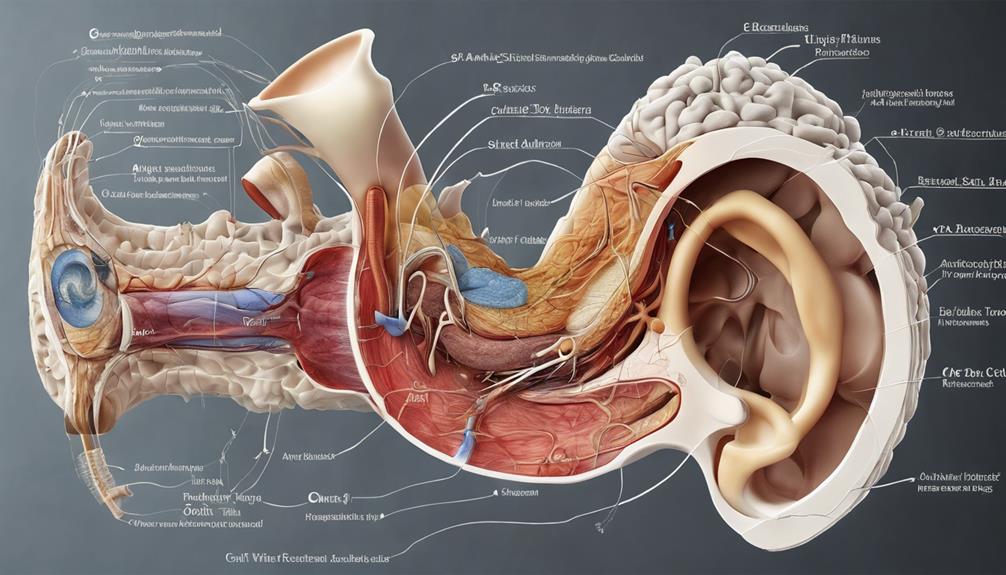
In terms of the impact of tobramycin on hearing loss, its importance may be underestimated.
Have you ever wondered how this common antibiotic can lead to potential damage in our ears?
Let's explore the intricate mechanisms behind tobramycin-induced hearing impairment and uncover the essential insights that can help us better understand and potentially mitigate this side effect.
Key Takeaways
- Tobramycin damages inner ear hair cells, leading to irreversible hearing loss.
- Genetic factors increase susceptibility to tobramycin-induced ototoxicity.
- Hair cell damage pathways involve disruption of essential cellular processes.
- Monitoring drug levels and genetic predispositions are crucial in preventing hearing loss.
Tobramycin's Mechanism of Ototoxicity
Tobramycin exerts its ototoxic effects by directly damaging the delicate hair cells within the inner ear, causing significant impairment in auditory function. This damage occurs primarily in the cochlea, a spiral-shaped structure responsible for converting sound vibrations into electrical signals that the brain can interpret. The inner ear houses sensory cells crucial for hearing, including the hair cells that detect sound waves and transmit signals to the auditory nerve. When tobramycin interferes with these hair cells, it can lead to permanent hearing loss.
The inner ear's intricate architecture makes it particularly vulnerable to the toxic effects of tobramycin. The drug disrupts the normal functioning of these hair cells, ultimately resulting in their degeneration and loss. Once these cells are damaged, they're unable to regenerate, leading to irreversible hearing impairment. This profound impact on the inner ear underscores the importance of monitoring tobramycin usage carefully, especially in individuals with genetic predispositions or mitochondrial DNA mutations that heighten susceptibility to ototoxicity.
Impact on Auditory Hair Cells

Damage to the delicate auditory hair cells in the inner ear is a critical consequence of tobramycin exposure, often resulting in irreversible hearing loss. Tobramycin, commonly used to treat infections like otitis media, exerts its ototoxic effects by directly damaging the sensory cells in the cochlea. This damage leads to sensorineural hearing loss, affecting the ability to perceive sound accurately. The side effects of tobramycin on auditory hair cells can have profound implications for individuals undergoing treatment with this medication, highlighting the importance of monitoring hearing function during therapy.
Understanding the specific pathways through which tobramycin impacts auditory hair cells is an active area of research. Researchers are working to elucidate the mechanisms involved in the toxicity of tobramycin to develop strategies that can mitigate or prevent hearing loss associated with its use. By unraveling the intricate processes through which tobramycin damages auditory hair cells, scientists aim to improve treatment outcomes and minimize the risk of irreversible hearing impairment for patients receiving this medication.
Genetic Factors in Hearing Loss
In understanding the potential genetic factors contributing to hearing loss, researchers have identified specific genetic markers and mitochondrial DNA mutations that can increase susceptibility to aminoglycoside-induced ototoxicity. Genetic susceptibility is a crucial aspect in the development of drug-induced hearing loss, particularly with ototoxic medications like tobramycin.
Here are key points to consider:
- Certain genetic factors and mitochondrial DNA mutations can predispose individuals to aminoglycoside ototoxicity, including hearing loss.
- Genetic susceptibility plays a significant role in drug-induced hearing loss associated with ototoxic medications like tobramycin.
- Patients with specific genetic predispositions require closer monitoring when using ototoxic medications to prevent hearing damage.
Mitochondrial DNA abnormalities are known to contribute to the risk of aminoglycoside-induced hearing loss. Avoiding ototoxic antibiotics in individuals with genetic susceptibility is essential to prevent permanent hearing impairment. Understanding these genetic factors is essential in personalized medicine approaches to mitigate the risk of ototoxicity and preserve hearing function.
Pathways of Ototoxic Hair Cell Damage

Among the mechanisms underlying ototoxic hair cell damage, a key pathway involves the disruption of crucial cellular processes essential for auditory function. Tobramycin, through its toxic effects on the cochlea, interferes with the maintenance of hair cell integrity and function. This disruption can lead to the degeneration and death of these sensory cells, resulting in sensorineural hearing loss.
The severity of tobramycin-induced hair cell damage can vary depending on factors such as dosage and duration of exposure. High-frequency hearing loss is a common manifestation of tobramycin ototoxicity, impacting the perception of sounds in the higher range. Both ears are typically affected by tobramycin-induced cochlear toxicity, contributing to bilateral hearing impairment.
Understanding the pathways through which tobramycin causes ototoxic hair cell damage is crucial in developing strategies to mitigate its severe side effects on hearing.
Strategies for Hair Cell Protection
Exploring proactive measures to safeguard hair cells from tobramycin-induced hearing impairment involves strategic considerations such as minimizing dosage, closely monitoring medication levels, and assessing genetic predispositions.
When aiming to protect hair cells from tobramycin's ototoxic effects, several key strategies can be implemented:
- Minimize Dosage: Utilize the lowest effective dosage of tobramycin to reduce the risk of ototoxicity and potential damage to hair cells.
- Monitor Medication Levels: Regularly monitor tobramycin levels, especially in individuals with compromised kidney function, to adjust dosages accordingly and mitigate ototoxic effects.
- Assess Genetic Predispositions: Consider genetic factors and mitochondrial DNA mutations that may predispose individuals to tobramycin-induced ototoxicity. Close monitoring is crucial in such cases to prevent irreversible damage to hair cells.
Frequently Asked Questions
Does Tobramycin Cause Hearing Loss?
Yes, tobramycin can cause hearing loss. It's important to monitor for signs like tinnitus, dizziness, and hearing impairment when taking this medication. Factors like dosage, treatment duration, and existing health conditions can increase the risk.
Genetic factors and mitochondrial DNA mutations may also play a role in susceptibility to tobramycin-induced ototoxicity. Being aware of these factors and closely monitoring for symptoms are crucial when using this antibiotic.
Can Tobramycin Eye Drops Cause Ototoxicity?
Yes, tobramycin eye drops can cause ototoxicity, leading to hearing loss. While the risk is lower than with systemic use, it's still a concern.
Symptoms may include hearing loss, tinnitus, and balance issues. Following prescribed usage and promptly reporting any unusual symptoms to a healthcare provider is crucial for preventing ototoxicity.
It's essential to be vigilant and proactive in monitoring for these potential side effects.
Can You Get Ototoxicity From Inhaled Tobramycin?
Yes, ototoxicity can occur from inhaled tobramycin, potentially resulting in hearing loss and balance issues. However, the risk is generally lower when compared to systemic administration.
It's vital to monitor for any signs of hearing impairment while undergoing inhaled tobramycin treatment to address any changes promptly. Consulting healthcare providers if experiencing hearing-related changes is crucial for managing potential ototoxic effects of inhaled tobramycin.
What Antibiotics Cause Hearing Loss?
Absolutely, a notable fact is that various aminoglycoside antibiotics, including neomycin, kanamycin, amikacin, gentamicin, and tobramycin, can lead to hearing loss. Monitoring both medication levels and hearing function is essential when using these ototoxic antibiotics to prevent irreversible damage to the auditory system.
Genetic predispositions to aminoglycoside ototoxicity may necessitate closer monitoring with antibiotics like tobramycin to avert hearing impairment.
Conclusion
In conclusion, tobramycin's ototoxicity poses a significant risk to hearing health, damaging both vestibular and cochlear structures. By understanding the mechanisms of ototoxicity and implementing strategies for hair cell protection, healthcare providers can minimize the risk of irreversible hearing loss in patients undergoing treatment with aminoglycoside antibiotics.
Remember, when it comes to preserving hearing, prevention is key – as the saying goes, an ounce of prevention is worth a pound of cure.
Taylor brings a dynamic and analytical perspective to the Deaf Vibes team, focusing on research-driven content that educates and informs. With an unquenchable curiosity for new developments, policies, and social issues affecting the deaf and hard-of-hearing community, Taylor’s writing is a crucial resource for readers seeking to navigate these areas. Whether breaking down legal rights, highlighting educational opportunities, or offering guides on accessible technology, Taylor’s work is an invaluable asset to those seeking to empower themselves and others. Taylor’s commitment to accuracy and depth ensures that our readers have access to reliable and actionable information.
Understanding Hearing Loss
How Seizures Can Cause Hearing Loss: A Comprehensive Guide
Intriguing connections between seizures and hearing loss unveil surprising insights, hinting at a deeper relationship worth exploring further.

Exploring the intricate connection between seizures and hearing loss reveals a fascinating trend, highlighting the extent to which brain activity can impact more than expected.
The repercussions of seizures on auditory function reveal a complex interplay that warrants further investigation. Understanding how these neurological events can potentially lead to hearing impairment opens up a realm of possibilities in terms of treatment and management strategies.
The implications of this relationship are profound and offer a unique perspective on addressing the multifaceted nature of such conditions.
Key Takeaways
- Seizures damage auditory pathways, leading to temporary or permanent hearing loss.
- Abnormal neuronal excitability in epilepsy impacts inner ear function, causing sensorineural hearing impairment.
- Understanding mechanisms crucial for differentiating transient vs. long-term hearing issues post-seizures.
- Effective management strategies include personalized treatment, monitoring for side effects, and interdisciplinary collaboration.
Mechanisms of Seizure-Induced Hearing Loss
Seizures can directly damage the auditory pathways in the brain, leading to seizure-induced hearing loss. In individuals with epilepsy, abnormal neuronal excitability during focal seizures can impact the inner ear's function, resulting in sensorineural hearing loss. The disruption of auditory nerve pathways by seizure activity can cause temporary or permanent impairments in hearing. This process involves complex interactions between the electrical disturbances characteristic of seizures and the intricate mechanisms responsible for auditory signal transmission within the brain.
Furthermore, prolonged or severe seizures may trigger metabolic changes in the inner ear structures, affecting their ability to process sound effectively. These alterations can manifest as varying degrees of hearing loss, highlighting the importance of monitoring individuals with epilepsy for post-seizure auditory complications. Understanding the mechanisms underlying seizure-induced hearing loss is crucial for differentiating between transient hearing disturbances and potential long-term consequences on auditory health. By elucidating these intricate processes, healthcare professionals can better address the auditory challenges faced by individuals with epilepsy.
Types of Seizures Associated With Hearing Impairment

Among the various types of epileptic events, those affecting specific brain regions can lead to pronounced auditory symptoms, including hearing loss. Epilepsy with auditory features often involves seizures originating in the temporal lobe, impacting the auditory cortex and pathways crucial for hearing. Complex partial seizures with auditory manifestations such as buzzing, ringing, or abnormal sounds can disrupt normal hearing functions. Additionally, prolonged or severe seizures may result in damage to the auditory system, leading to post-seizure hearing loss.
| Types of Seizures Associated With Hearing Impairment | Description | Brain Regions Involved | Auditory Symptoms |
|---|---|---|---|
| Temporal Lobe Seizures | Arise in the temporal lobe | Temporal Lobe | Hearing loss, auditory hallucinations |
| Complex Partial Seizures with Auditory Features | Involve abnormal sounds perception | Auditory Cortex | Buzzing, ringing, abnormal auditory sensations |
| Seizures Causing Post-Seizure Hearing Loss | Result in hearing impairment post-seizure | Auditory Pathways | Temporary or permanent hearing loss |
Impact of Seizures on Auditory Pathways
Disruption of normal sound signal processing in the brain can occur as a result of seizures, potentially leading to temporary or permanent hearing loss. When seizures impact auditory pathways, they interfere with the intricate mechanisms involved in perceiving and interpreting sound.
Here are some key points to consider:
- Abnormal Electrical Activity: Seizures trigger abnormal electrical activity in the brain, disrupting the transmission of auditory signals.
- Temporary or Permanent Hearing Loss: Depending on the severity of the seizure and its effects on the auditory pathways, individuals may experience temporary or permanent hearing loss.
- Sensorineural Hearing Loss: Seizure-induced hearing loss often presents as sensorineural hearing loss, affecting the inner ear's ability to transmit sound effectively.
- Variability in Impact: The impact of seizures on auditory pathways can vary based on factors such as seizure type, duration, and intensity, highlighting the complex relationship between seizures and hearing complications.
Understanding how seizures affect auditory pathways is crucial for developing effective management strategies to mitigate the risk of associated hearing complications.
Treatment Approaches for Seizure-Related Hearing Loss
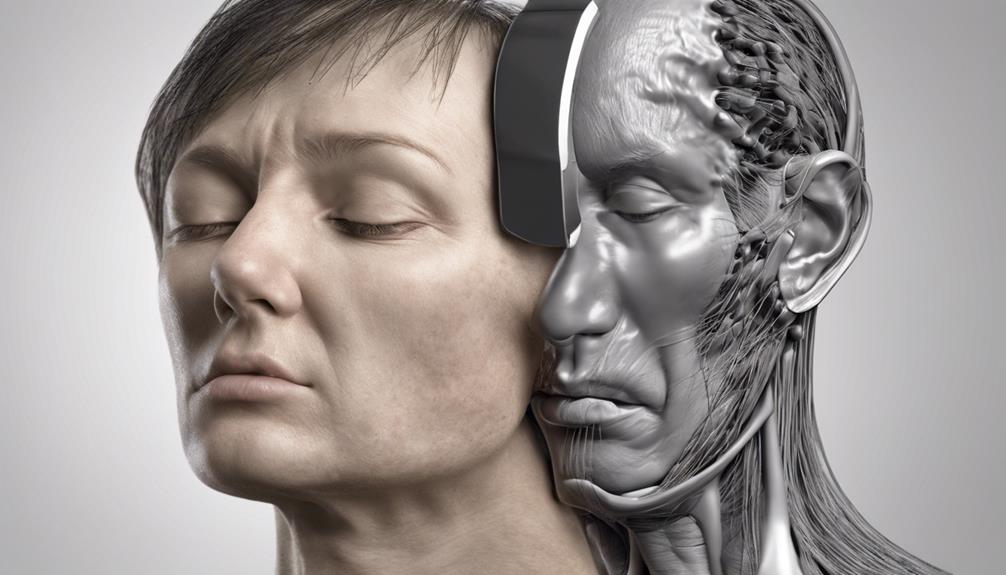
In the management of seizure-related hearing loss, the utilization of antiepileptic medications to control epilepsy plays a crucial role in minimizing the impact on auditory function. For individuals with an uncommon form of epilepsy that includes language before losing consciousness, such as focal impaired awareness seizures, antiepileptic drugs like carbamazepine and levetiracetam are commonly used. These medications help control seizures, potentially reducing the risk of hearing loss.
However, some individuals may not respond well to standard medications, necessitating personalized treatment strategies. Monitoring for potential side effects of antiepileptic drugs is essential in the management of seizure-related hearing loss, as these medications can have adverse effects on hearing and overall health. Collaboration between healthcare providers and specialists is crucial to develop a comprehensive treatment plan that addresses both the epilepsy and associated hearing issues effectively.
Managing Hearing Loss in Epilepsy Patients
When managing hearing loss in epilepsy patients, addressing the direct impact of seizures on the auditory system is paramount to understanding and addressing potential auditory impairments. Here are key considerations:
- Monitoring Post-Seizure Symptoms: Regularly assess for any changes in hearing after seizures to promptly identify and manage any emerging issues.
- Consulting Specialists: Seeking guidance from audiologists or otolaryngologists can aid in determining the extent of hearing loss and devising appropriate interventions.
- Investigating Underlying Causes: Explore potential factors such as medication side effects, neurological impacts of seizures, or genetic predispositions like autosomal dominant traits or family history of hearing loss.
- Managing Loss of Consciousness: Develop strategies to mitigate the risk of injury from falls during seizures, as head trauma can contribute to hearing impairment.
Frequently Asked Questions
Can Seizures Cause Hearing Loss?
Yes, seizures can cause hearing loss. The disruption of auditory processing in the brain during a seizure can lead to temporary hearing impairment. Post-seizure symptoms, such as hearing loss, are often reversible and may improve as the brain recovers.
Although the exact mechanism isn't fully understood, it's believed to involve transient changes in auditory function. Seeking timely medical evaluation and management can effectively address post-seizure hearing issues.
What Neurological Condition Causes Hearing Loss?
We explore the neurological condition causing hearing loss. Various factors, including autoimmune inner ear disease, Meniere's disease, or auditory neuropathy spectrum disorder, can lead to this impairment.
These conditions affect the auditory nerve or cochlea, disrupting sound transmission. Detailed evaluation and timely intervention are crucial to address such issues effectively.
Understanding the underlying neurological mechanisms is pivotal in managing and treating hearing loss associated with these conditions.
What Are the 4 Stages of a Seizure?
We understand the 4 stages of a seizure as follows: prodromal, aura, ictal, and postictal.
The prodromal phase shows early signs such as mood changes or headaches.
The aura stage involves sensory experiences like smells or sounds before the seizure.
The ictal phase is the seizure activity itself, characterized by convulsions or altered consciousness.
Does Your Brain Go Back to Normal After a Seizure?
After a seizure, the brain usually returns to its normal state during the postictal period. Our brain may go through temporary changes affecting cognitive and sensory functions, like hearing.
As the brain's electrical activity stabilizes, cognitive functions gradually recover, but some individuals may have lingering symptoms. Monitoring cognitive functions and addressing sensory issues post-seizure are crucial for optimal recovery.
Think of it like a storm passing, with the brain gradually returning to its calm state.
Conclusion
In conclusion, the intricate relationship between seizures and hearing loss highlights the importance of genetic analysis in diagnosing and managing auditory complications in epilepsy patients.
An interesting statistic to note is that up to 40% of individuals with epilepsy experience some form of hearing impairment, underscoring the need for comprehensive care strategies that address both neurological and auditory health concerns.
By understanding the molecular mechanisms at play, we can pave the way for personalized treatment approaches in the future.
Taylor brings a dynamic and analytical perspective to the Deaf Vibes team, focusing on research-driven content that educates and informs. With an unquenchable curiosity for new developments, policies, and social issues affecting the deaf and hard-of-hearing community, Taylor’s writing is a crucial resource for readers seeking to navigate these areas. Whether breaking down legal rights, highlighting educational opportunities, or offering guides on accessible technology, Taylor’s work is an invaluable asset to those seeking to empower themselves and others. Taylor’s commitment to accuracy and depth ensures that our readers have access to reliable and actionable information.
Understanding Hearing Loss
How Stroke Can Cause Hearing Loss in One Ear
Mysteries unravel as we delve into the intricate relationship between stroke and hearing loss in one ear, revealing unexpected connections.

When delving into the intricate connection between suffering a stroke and experiencing hearing loss in one ear, it is evident that the impact goes beyond just physical constraints. This correlation sheds light on the complex ways our bodies respond to these conditions.
Exploring how stroke can specifically lead to hearing loss in one ear unveils a fascinating yet crucial aspect of our overall well-being that warrants further exploration. The implications of this link extend far beyond what meets the eye, prompting a deeper examination into the mechanisms at play and the potential implications for holistic healthcare.
Key Takeaways
- Stroke-induced damage can lead to sudden sensorineural hearing loss in one ear.
- Ischemic strokes can significantly impact auditory pathways, affecting sound perception.
- Communication challenges and quality of life can be affected by hearing loss post-stroke.
- Early identification and management of hearing issues post-stroke are crucial for improved outcomes.
Stroke and Unilateral Hearing Loss
Stroke can lead to unilateral hearing loss, affecting one ear more significantly than the other due to disruptions in the auditory pathways caused by the brain damage. This hearing impairment can impact various aspects of auditory function, such as sound localization and speech understanding. The specific impact on hearing post-stroke can vary depending on the location and extent of the brain damage incurred during the stroke event. Individuals may struggle with accurately determining the direction of sounds or understanding speech in noisy environments due to this unilateral hearing loss.
Treatment options for unilateral hearing loss following a stroke may involve auditory rehabilitation programs aimed at improving speech comprehension and sound localization abilities. Additionally, the use of hearing aids can help individuals compensate for the hearing loss in the affected ear, enhancing their overall auditory experience and quality of life. Understanding the implications of stroke on hearing is crucial in developing effective interventions to address the impact of unilateral hearing loss in individuals who've experienced a stroke.
Mechanisms of Hearing Impairment Post-Stroke
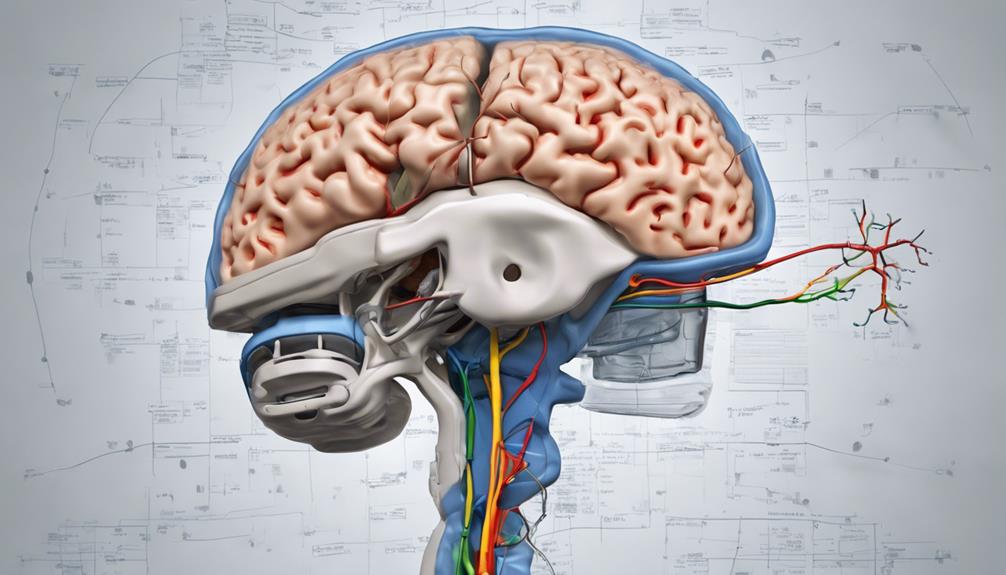
Damage to the auditory pathways in the brain following a stroke can result in hearing impairment in one ear. The impact of stroke on hearing is multifaceted, with ischemic strokes and hemorrhagic strokes affecting auditory function through different mechanisms. Ischemic strokes, stemming from restricted blood flow, can disrupt the blood supply to specific auditory regions, leading to deficits in auditory processing. Conversely, hemorrhagic strokes, characterized by bleeding in the brain, may affect the auditory cortex and related structures, influencing how sound is perceived unilaterally. The location and extent of brain damage post-stroke play a crucial role in determining the nature and severity of hearing loss experienced in one ear. Understanding the intricate relationship between stroke and auditory pathways is essential for comprehensively addressing unilateral hearing impairments in stroke survivors.
| Mechanism | Type of Stroke | Effect on Hearing |
|---|---|---|
| Disrupted blood supply | Ischemic Stroke | Impacts specific auditory regions |
| Auditory cortex damage | Hemorrhagic Stroke | Affects auditory processing and perception |
Impact of Stroke on One Ear
Emerging research highlights the intricate relationship between auditory function and cerebral events, particularly emphasizing the impact of stroke on unilateral hearing abilities. When a stroke occurs, the disrupted blood supply can lead to damage in the auditory system of one ear. This damage affects the nerves and structures responsible for processing sound, potentially resulting in sudden sensorineural hearing loss in that ear. Ischemic strokes, which restrict blood flow to specific areas of the brain, can have a more pronounced impact on hearing in one ear compared to other types of strokes.
Monitoring changes in hearing in the affected ear post-stroke is crucial for the early detection and management of potential hearing loss. By closely monitoring the auditory function in stroke patients, healthcare providers can intervene promptly to mitigate the effects of hearing impairment. Understanding the relationship between strokes and hearing loss in one ear is essential for providing comprehensive care to individuals who've experienced a stroke.
Hearing Loss in Stroke Patients
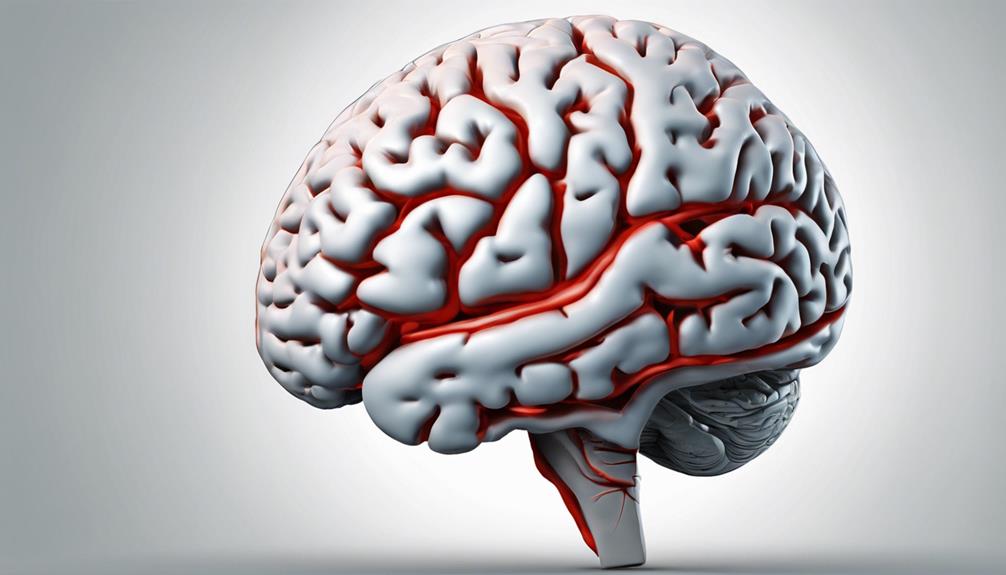
Exploring the intricate relationship between stroke and auditory function reveals the significant impact of cerebrovascular events on hearing loss in patients. Hearing loss in stroke patients often stems from damage to the auditory pathways in the brain, particularly in cases where the stroke affects specific regions responsible for processing sound. This can result in sensorineural hearing loss, where the inner ear or the auditory nerve is impaired due to brain damage caused by the stroke. Communication difficulties may arise, impacting the quality of life for individuals experiencing this type of hearing loss.
The severity and manifestation of stroke-induced hearing loss can vary depending on the type and location of the stroke. Recognizing and managing hearing loss early on in stroke patients is crucial for effective rehabilitation and improved outcomes. By addressing hearing issues promptly, healthcare professionals can help minimize the negative impact on communication abilities and overall well-being. Early intervention and appropriate management strategies play a pivotal role in enhancing the quality of life for stroke survivors dealing with hearing loss.
Preventing Hearing Loss After Stroke
How can immediate medical interventions post-stroke contribute to preventing or minimizing hearing loss in affected individuals?
Monitoring for sudden changes in hearing post-stroke is essential, as prompt action can address emerging issues.
Rehabilitation therapies, including auditory training, play a crucial role in enhancing communication abilities post-stroke.
Healthcare providers recommend regular follow-ups to monitor and manage potential hearing loss effectively.
Prevention strategies post-stroke involve a multidisciplinary approach, including early identification of hearing issues and tailored interventions.
Comprehensive assessments by healthcare professionals can aid in early detection of hearing loss, leading to timely interventions.
Implementing personalized rehabilitation plans that incorporate auditory training can significantly improve outcomes for individuals at risk of hearing loss post-stroke.
Frequently Asked Questions
Why Did I Suddenly Lose My Hearing in One Ear?
We suddenly lost hearing in one ear due to various reasons like inner ear issues, infections, or even wax buildup.
It's essential to seek medical attention promptly to determine the underlying cause. Diagnostic tests can pinpoint the exact reason for the sudden hearing loss and guide appropriate treatment.
Monitoring any associated symptoms and following up with healthcare providers can aid in managing and potentially resolving the hearing loss.
What to Do When Can't Hear Out One Ear?
When we can't hear out of one ear, it's crucial to seek immediate medical attention. This sudden hearing loss could be a sign of various underlying conditions, including issues with the ear canal or inner ear.
Prompt evaluation by a healthcare professional can help diagnose the cause and determine the appropriate treatment. Ignoring unilateral hearing loss can lead to further complications, so it's essential to act swiftly and get the necessary medical care.
Can Hearing Loss From Stroke Be Reversed?
Yes, hearing loss from a stroke can sometimes be reversed through prompt medical intervention and targeted rehabilitation efforts. Immediate treatment for the underlying cause of the stroke is vital for improving the chances of reversing associated hearing loss.
Rehabilitation therapies like speech therapy and auditory training play a crucial role in restoring hearing function post-stroke. Factors such as the stroke's severity, affected brain area, and timely intervention influence the extent of recovery.
What Is the Most Common Cause of Unilateral Hearing Loss?
Damage to the inner ear or auditory nerve on one side is the most common cause of unilateral hearing loss. Other factors like infections, head trauma, acoustic neuroma, and Meniere's disease can also lead to hearing loss in one ear.
Unilateral hearing loss can impact sound localization, understanding speech in noisy environments, and overall quality of life. Seeking immediate medical attention is crucial when experiencing sudden or unexplained hearing loss in one ear to rule out serious underlying conditions.
Conclusion
In conclusion, the intricate relationship between stroke and hearing loss in one ear underscores the importance of maintaining cardiovascular health.
By understanding the mechanisms of auditory impairment post-stroke and recognizing the potential warning signs of sudden hearing loss, individuals can take proactive steps to prevent long-term consequences.
Just as blood vessels nourish both the brain and the ears, safeguarding against stroke risk factors can ultimately protect our precious sense of hearing.
Taylor brings a dynamic and analytical perspective to the Deaf Vibes team, focusing on research-driven content that educates and informs. With an unquenchable curiosity for new developments, policies, and social issues affecting the deaf and hard-of-hearing community, Taylor’s writing is a crucial resource for readers seeking to navigate these areas. Whether breaking down legal rights, highlighting educational opportunities, or offering guides on accessible technology, Taylor’s work is an invaluable asset to those seeking to empower themselves and others. Taylor’s commitment to accuracy and depth ensures that our readers have access to reliable and actionable information.
-
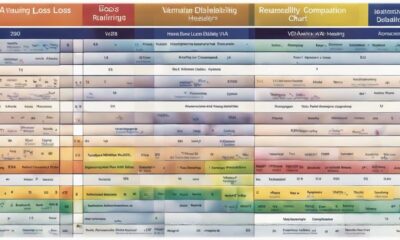
 Navigating the VA System4 weeks ago
Navigating the VA System4 weeks agoVA Hearing Loss Rating Chart: Understanding Disability Compensation
-

 Therapies and Interventions3 months ago
Therapies and Interventions3 months ago10 Auditory Processing Goals for Effective Speech Therapy
-

 Living with Hearing Loss2 months ago
Living with Hearing Loss2 months ago10 Deaf-Friendly Dating Sites to Find Your Perfect Match
-

 Sign Language3 months ago
Sign Language3 months agoSign Language Emoji Translator: How to Communicate With Gestures
-

 Tinnitus1 month ago
Tinnitus1 month agoVA's Rating System for Tinnitus and Hearing Loss Explained
-

 Navigating the VA System3 weeks ago
Navigating the VA System3 weeks agoUnderstanding Bilateral Hearing Loss VA Rating Criteria
-

 Vetted1 month ago
Vetted1 month ago15 Best Oticon Hearing Aids to Improve Your Hearing in 2024
-

 Living with Hearing Loss2 months ago
Living with Hearing Loss2 months agoAn Introduction to Deaf Culture: Understanding the Basics



















